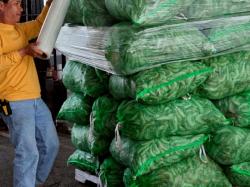Study: Seafood Pallets Prone To Deadly Pathogens
June 16, 2010 | 3 min to read

ORLANDO, Fla., June 16 — New independent microbiology testing reveals that one in every six wood pallets that transport food in Los Angeles, CA tested positive for one of three types of pathogens that spread easily and endanger the nation's food supply and the lives of American consumers.
Either E. coli, Listeria, or Enterobacter cloacae, a bacterium that causes sickness and even death in people with lowered immune systems, were found on one in every six wood pallets tested in Los Angeles. Tests were conducted in multiple locations in Los Angeles on both wood and plastic pallets used by supermarkets, restaurants and seafood retailers. In addition to the pathogens, the Los Angeles testing showed that 50 percent of all wood pallets sampled contained high bacteria counts in excess of 100,000 spores per gram, indicative of unsanitary conditions. Four of the wood pallet samples had bacteria counts in the millions of spores per gram range. Conversely, no pathogens and no high bacteria counts were found on any of the plastic pallets tested.
The Los Angeles tests, which are the sixth in a series of independent tests on wood and plastic pallets conducted from Portland, ME to New Orleans, LA, add to the growing body of evidence showing that wood pallets harbor bacteria and deadly pathogens that threaten the safety of our nation's food and pharmaceuticals transported on wood pallets. The National Consumers League, the non-profit and independent consumer advocacy group, last month found dangerous pathogens on about one in every seven wood pallets they tested in Houston and Miami (click here to view the NCL news release). The pallets tested by NCL were being used to transport food.
"How many more tests need to be conducted before Congress and the FDA take action?" said Bob Moore, Chairman & CEO of iGPS, a plastic pallet rental service that commissioned the series of scientific tests on wood pallets.
"The President's food safety working group recommends a public-health focused approach to food safety that prioritizes prevention, instead of constantly reacting to the outbreak of foodborne illness," said Moore. "Wood pallets are a good place to start; almost every food and medicine used by consumers has been on a pallet. The wood industry's own best practices call for taking simple, easy steps to prevent the spread of foodborne illness, including using clean, dry pallets for food, storing pallets indoors and cleaning them. But the wood pallet industry's track record demonstrates they won't take these steps themselves; Congress and FDA must require them to do so in order to protect consumers.
"We renew our call on Congress to require all pallets to meet minimum sanitary standards and use the latest technology that allows products to be traced throughout the U.S. supply chain," continued Moore. "These easy, cost-effective improvements in the supply chain will make the American public safer."
iGPS researchers gathered samples from wood and plastic pallets located at markets and seafood retailers and wholesalers in and around Los Angeles. They submitted the samples to an independent microbiology lab, ESS Laboratories of Bedford, VA, for testing. All of the pallets tested were in regular use; in many cases the samples were gathered from pallets that had just been used to move food items. iGPS videotaped the unsanitary wood pallets in Los Angeles and is making that video available today to the news media.
Recent tests commissioned by iGPS have found Salmonella, E. coli, Listeria and extremely high bacteria counts on scores of wood pallets pulled at random from public markets and retail food outlets in Washington, DC, Baltimore, Philadelphia, Portland, ME, and New Orleans. Wood pallets also threaten food supplies because they are subject to infestations from insects that carry a host of diseases such as Salmonella that put our food at risk. The Centers for Disease Control and Prevention (CDC) estimates that 76 million foodborne illness cases occur every year in the United States. Salmonella bacteria cause at least 40,000 illnesses a year in the U.S., and an estimated 400 deaths, the CDC reports. E. coli is a potentially lethal group of bacteria that every year sickens more than 70,000 Americans. And Listeriosis is responsible for 2,500 illnesses and 500 deaths in the United States annually – the leading cause of death among food-borne bacterial pathogens.
Source: iGPS
